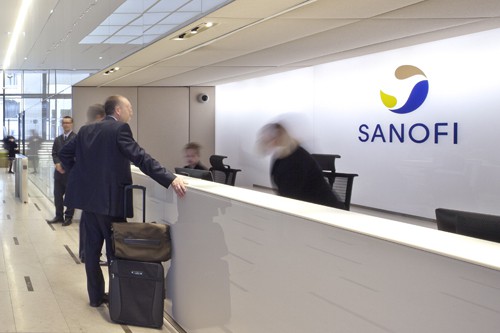
Sanofi has updated its $2.17bn immuno-oncology deal with long-term partner Regeneron, refocusing the alliance around two promising bispecific antibody candidates.
Sanofi will pay Regeneron $462m, which will pay off the balance from the original immuno-oncology (IO) deal, which was due to expire in 2020. This fee covers the Sanofi share of the IO discovery programme costs for the last quarter of 2018 and up to $120m in development costs for the two selected clinical-stage bispecific antibodies. It also includes a termination fee for the other programmes under the original deal, though the partners haven’t clarified which programmes will be discontinued.
The two candidates selected as most promising are REGN5458 (aka BCMAxCD3), a BCMA and CD3 targeting bispecific antibody and REGN4018, a MUC16 and CD3 targeting bispecific antibody. Both are in phase 1 trials as monotherapies and the latter is also being studied in combination with the partners’ PD-1 immunotherapy, Libtayo.
The new collaboration will allow Sanofi the rights to opt-in on these two programmes, either when proof of concept is achieved, or when the allocated funding is expended, whichever happens first.
Sanofi will pay $120m in development costs for both candidates but will only lead the development and commercialisation of BCMAxCD3, which is in testing for multiple myeloma.
A further $70m will be committed from Regeneron to develop that candidate to target the B-cell maturation antigen (BCMA) protein.
That particular protein has emerged as the most promising new target in multiple myeloma, and is now been pursued by a pack of competing pipeline candidates: CAR-Ts from Celgene/Bluebird, Celgene/Juno, J&J/Legend Biotech, a drug antibody conjugate from GSK and a bispecific antibody from Amgen.
While Sanofi and Regeneron’s Libtayo may have joined the checkpoint inhibitor field too late to make much of an impact, Sanofi doesn’t want to miss the boat in BCMA, or the emerging MUC field, and the agreement re-draft aims to accelerate the partnerships’ work on these candidates.
Regeneron will take the lead for the development and commercialisation of MUC16xCD3 but only in the US, with Sanofi leading its eventual commercialisation everywhere else.
That candidate is currently in trials for ovarian cancer, but it has potential in cancers expressing the MUC16 biomarker is also frequently expressed in lung, pancreatic, gastric and colorectal cancer.
Sanofi said that the new agreement provides “increased flexibility to advance its early-stage immuno-oncology pipeline independently while Regeneron retains all rights to its other immuno-oncology discovery and development programmes”.




